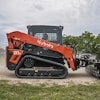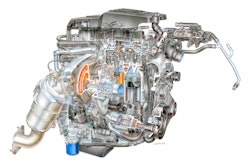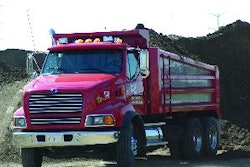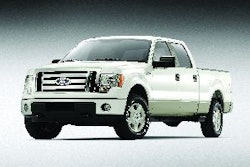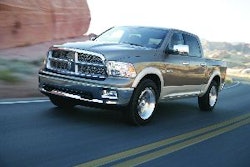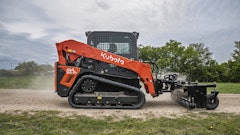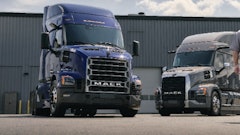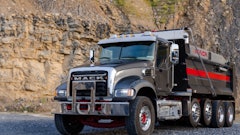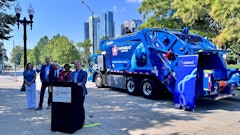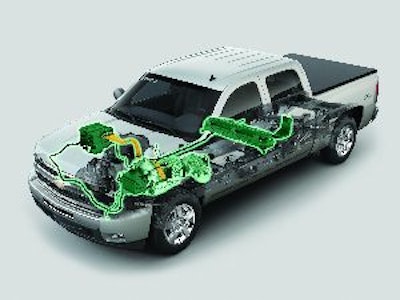
We always say you should job rate your truck," says Joe Veltri, director of Dodge Trucks, Chrysler. "Make sure you know exactly what you use the truck for, not just on average, but all of the time."
Based on your application, there are several points to consider when choosing the best powertrain for your pickup. According to Dennis Slevin, F-150 vehicle engineering manager, Ford, they include:
- base cost of the powertrain (engine/transmission combination);
- duty cycle (light payloads or towing vs. heavier payloads or towing);
- operating environmental conditions (on-road vs. off-road or construction sites);
- and desired options (some options offered only on specific powertrain combinations).
Sizing up gas engine alternatives
Picking the right engine for your 1/2-ton pickup involves balancing capability against fuel economy and price, says Joel Fukumoto, Toyota Truck product manager. "The first priority should be capability. [There is no point] in choosing a lower-priced engine that saves on fuel, but can't do what you need it to do," he says. "That's why large V8s still make up nearly 70% of the 1/2-ton market and V6 engines make up just over 10%."
It's also vital to understand exactly how much your truck and its engine can tow.
"Even if you have a big trailer, choosing the biggest engine isn't necessarily what you need to do," says Carl Hillenbrand, Silverado product manager, General Motors. "The towing ratings vary by models, by engines and by 2WD and 4WD. On some models between the 5.3-liter and a 6-liter, you basically aren't getting any extra if you don't have an extra towing package on it. You have already basically maxed out the chassis and cooling."
First, you need to determine what you actually tow. "Sometimes people guess what their trailer weighs," says Hillenbrand. He advises taking it to a scale to weigh it. "From there, we have our towing charts. Try to figure out what combination fits best. [You] are probably better off with an engine that is as small as possible but can still get the job done well."
Don't assume small displacement engines are always more fuel efficient than their larger counterparts. "For example, GM's 5.3-liter V8 engine actually gets better fuel economy than the company's smaller V6," says Hillenbrand. This is because the 5.3-liter V8 has more advanced technology. "It has active fuel management. It has a lot of enhancements, including six-speed transmissions that are rolling out this year."
In the Dodge lineup, there is no difference in fuel economy between the smaller V8 and the larger HEMI V8. This is made possible by new technology implemented in the HEMI motor.
"We added variable valve timing [and] an active intake manifold. We increased the compression ratios...That allows us extended time that we can run in cylinder deactivation, because there is more power in four-cylinder mode," explains Veltri. "All of this technology resulted in the engine alone delivering about a 5% improvement in fuel economy." But it does come with a price - the HEMI is a $1,300 option.
You need to weigh the cost of technology vs. the savings. "If you look at initial costs vs. actual cost of usage of the vehicle, you have to balance how many miles you drive and when it will pay off," says Hillenbrand.
For lower miles, the value equation may be a V6. "[The vehicle] may not get the same fuel economy, especially loaded, as it could with a 5.3-liter engine. But if you don't drive very many miles, it may be a good selection," Hillenbrand states. "If you are driving enough to pay back the difference, then you need to pay for an increased size engine that has all of the extra technology on it."
Flex-fuel engines are another alternative. Flex-fuel trucks operate on both fuel types and often don't cost anymore than a conventional gas truck. "We don't charge any extra for the Flex Fuel engines," says Hillenbrand.
The benefits of the flex-fuel option depend on the cost difference between E85 (85% ethanol/15% gasoline) and standard gasoline. "A gallon of E85 fuel generates less energy than a gallon of gasoline, so a truck using E85 would use more fuel to go the same distance," says Fukumoto.
"It makes sense as long as you are able to make up the extra range, because E85 has about 20% to 25% less BTU as far as actual energy," says Hillenbrand. "When the price of gas was a bit higher, there was a definite benefit in some areas for people to be driving E85."
1/2-ton hybrid pros and cons
"On the surface, many folks look at the fuel economy label and assume lower overall operating cost for a hybrid, but this can be misleading," says Slevin. Hybrids typically come with a hefty price premium, which must be factored into the operating cost assessment.
Ultimately, the cost/benefit equation depends on how the vehicle is used. "Like any type of vehicle, the hybrid really pays off for people who drive more miles," says Hillenbrand. "The benefits are both city and highway, especially on our two-mode hybrid... The fuel economy rating on our 2WD hybrid is 21/22 mpg, and 20/20 mpg for the 4WD." By comparison, the 5.3-liter V8 yields 15/21 mpg for the 2WD and 14/20 mpg for the 4WD.
"Overall cost of ownership depends on the application," Slevin adds. "If it is being used as a delivery vehicle in a city driving application, there could be significant fuel savings. However, if it is being used to tow or in highway driving applications, the hybrid will not offer the same fuel benefit. Bottom line is a careful analysis would have to be conducted to verify if the initial price premium for the hybrid powertrain is offset by the fuel savings in the actual usage."
Veltri notes that payload capacity can be an issue. "The trick with a hybrid is you need a battery to run in electric," he comments. "The payload capability is determined by all of the components of the vehicle - the frame, axles, brakes and cooling system. If I don't change any of those and I add the weight of the battery, it is going to take away from the capability of the truck."
There is also the issue of towing performance. "Hybrids offer reduced capability in terms of reduced final drive ratio, which affects the off-the-line performance, and maximum trailer weight allowed," says Slevin.
Consider how the Silverado 1500 hybrid compares to its gas-powered counterpart. "You will not be able to get up to 9,000 lbs. towing; 6,100 lbs. is our max," says Hillenbrand. "That is still a lot of trailer. You can drive up to about 30 mph on electric only. Electric motors have an immense amount of torque. It is really good for launch performance. It basically has the towing capability of our four-speed transmission-equipped 5.3-liter V8 (without an optional axle ratio)."
Keep a close eye on hybrid technology. "As hybrid technology continues to evolve, capability is likely to improve," says Fukumoto. "But for now, hybrid trucks deliver capability about equal to or only slightly better than compact trucks. From a cost of ownership point of view, if you are willing to accept the capability trade off, it may make more sense to choose a smaller engine or perhaps even a smaller truck."
Diesel vs. gas
Diesel engines will cost substantially more up front, yet provide longer service life and higher resale value. Again, you have to calculate the cost of ownership by the number of miles driven to determine if a diesel makes sense.
"If you go back to point of purchase, a diesel engine in a 3/4-ton truck is a $7,000 option," says Veltri. Typically, you get a significant amount of that back at resale.
Fuel efficiency is also much better than gas engines. "Diesel engines typically are up to 25% more fuel efficient," says Jim Michon, truck fleet marketing manager, Ford.
"Diesels run very well under load," says Hillenbrand. Fuel economy is also better. "If you are loading full GVW on a truck and you are running diesel vs. gas, you are going to be drinking a lot more gas."
Due to the recent spread between gas and diesel prices, there has been a slight reversal, with some customers moving back to gas engines. "Some people were buying diesels that didn't absolutely need all of the capability," Hillenbrand notes. "We have seen up to a 15% swing away from diesel into gas."
Yet, as Michon points out, "Most of our diesel customers require the performance and capability it provides to do the job and will continue to purchase the diesel engine to meet these needs."
You give up a lot of capability by switching to gas. "The torque on our diesel is 660 ft.-lbs. On our 6.0-liter gas engine, it is 380 ft.-lbs.," notes Hillenbrand. "You are giving up 280 ft.-lbs. of torque. On the other hand, how much do you really need? I don't think there are too many people who need 660 ft.-lbs. of torque."
Even with the recent shift, diesel power continues to dominate the 3/4-ton market segment. "If you look at the last several months, the diesel 'take rate' in the segment has been running at about 65%," says Veltri. "It had been as high as 75%."
"Ideally, the commercial customer buys the right powertrain for his needs," says Michon. "If he's more interested in pulling a conventional trailer and can handle a lower Gross Combined Weight (GCW), he will go with a gas powertrain. If he's interested in higher GCW, he may choose a diesel."
Ironically, Allen Schaeffer, executive director for the Diesel Technology Forum believes the current economic climate may actually favor diesel, despite its higher initial cost. Customers are likely to hold onto trucks longer, rather than trade them in every three years. "You look at the longer value proposition and it is very strong in terms of higher resale value and reduced operating costs," he notes.
Schaeffer admits that the fuel prices can be variable. "Obviously, at $4 or $5 a gallon for diesel over $2 a gallon for gas, it is going to be a very long payback period," he says. But with the economy in contraction, diesel prices are falling. "What is happening now is the gap is closing."
(To calculate how much you could save with a diesel-powered vehicle, go to http://widgets.mslideas.com/dieselcalculator/.)
Diesel is also becoming more widely available at the pump. "We just did a public opinion survey that said 72% of the people found that diesel was readily available," says Schaeffer. "The last time we looked at it, we found that 42% of all service stations that existed in 2005 had at least one diesel pump."

